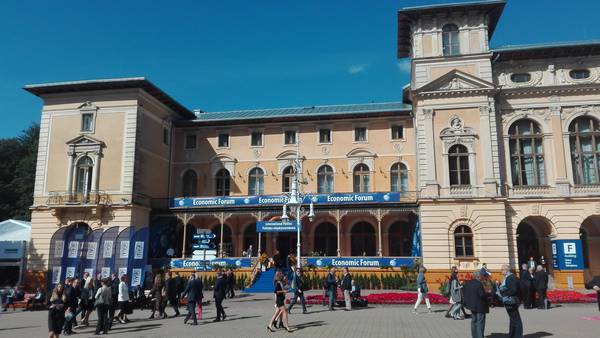Poland: Krynica Forum,cooperation is the fundamental element
29th edition, 5,500 guests and 200 round tables
26 September, 18:43In this year's edition, which was attended by many members of the Polish government given the upcoming political elections scheduled for October 13, the topic of the discussion was 'Tomorrow Europe. Strong, but which one?' and the aim was to answer not only the question of how Europe will fare in the next decade but also outline the strategy that European governments should follow within the global political and economic system.
Despite the awareness of the uncertainty linked to Brexit and its probable consequences, there is a plurality of views on what to do so that Europe does not fall behind and does not lose its importance. According to Maltese Economy Minister Christian Cardona, the EU must be close to the needs of the European citizen and support countries that are in difficulty, whereas according to the Swedish MP, and vice-president of OSCE Pa, Margareta Cederfelt, collaboration is essential.
"The countries that collaborate - she explained in the Forum opening plenary session - do not make war: I believe in the Europe of peace and collaboration between peoples. Security is one of our priorities and we must pay attention to the dangers that might come from the Russian Federation". According to the president of the Republika Srpska, Zeljka Cvijanovic, everything depends on the enlargement of the EU to new states, which is the key to further growth. And economic growth has also contributed to the creation of a stronger continent than "it was 50, 30 or 20 years ago." According to the director of the Polish Development Fund (PFR), Pawel Borys, the last decade was quite negative in Europe due to low growth and strong public debt: if we compare the increase in GDP, the average European average growth is around 10%, whereas the Polish GDP growth reaches 40% and the Chinese 100%. According to Borys the integration of the euro is not yet accomplished and to achieve it a European agreement on tax is necessary, but many countries are not ready to do so. "We need to start from the issues on which we have a lot in common - he said - to broaden cooperation, leaving out the problems when the different countries do not agree upon the solutions." There was instead unanimity of views on the EU's need for more funding and cooperation for innovation, both in the fields of artificial intelligence and cybersecurity, above all to avoid being too far behind China and the US, in addition to the giants of technology that grind tens of thousands of dollars in revenue each year. "Artificial intelligence - explained the director of Fasi.biz, Andrea Gallo - needs much more funding if we want to compete with the rest of the world at European level: the 2.5 billion euros allocated for 'Digital Europe' in the next spending 2021-2027 plan are not enough, considering they must be shared among 27 countries in seven years and that the technology giants (Apple, Amazon, Facebook, Alphabet, and Microsoft) have turnover in 2018 well 139 billion dollars." Among the new technologies, the forum focused on Blockchain: training and information are fundamental on this phase, the experts said. "We are facing an economic revolution - said the president of the Italia4Blockchain association, Pietro Azzara - we could create new secondary markets that do not exist at the moment." The Forum also had its celebratory moment with the award ceremony for the 'Man of the year 2018': Polish Prime Minister Mateusz Morawiecki. "In 2018 - the prime minister explained, receiving his prize - Poland was particularly strong, thanks to the entrepreneurs who take the bull by the horns. This prize goes to them, too." Speaking of growth, according to the SGH report presented at the Forum, Poland in terms of GDP per capita bridged the development gap between Warsaw and Athens in 2015 and it is likely to exceed Portugal by the end of 2019. The Poles, however, look with a certain concern at the new spending 2021-2027 plan. They could receive fewer funds and they don't hide their fears for a possible cutting off of funding, given the recent ruling of the EU Court of Justice regarding the pension reform. On this occasion, according to some analysts, the Polish Government has attempted to restrict the principle of "irremovability of judges intrinsically linked to their independence".(ANSA).














